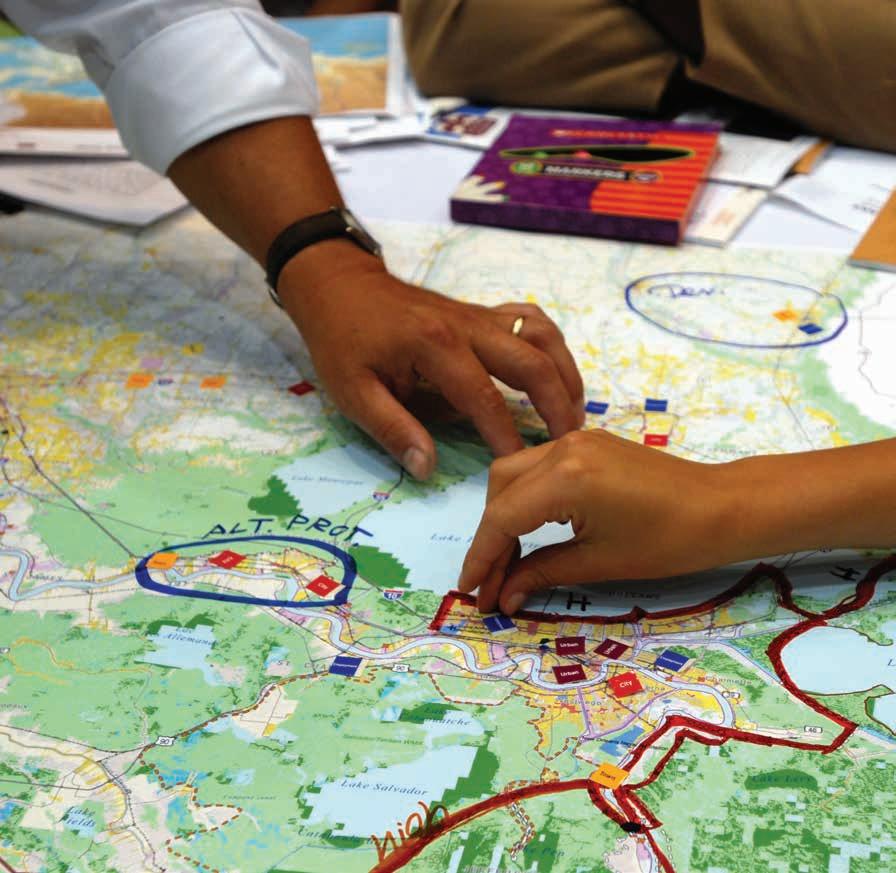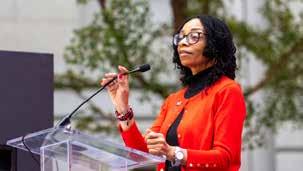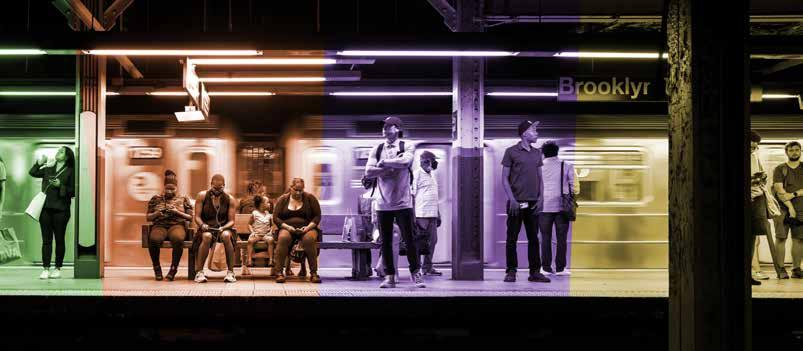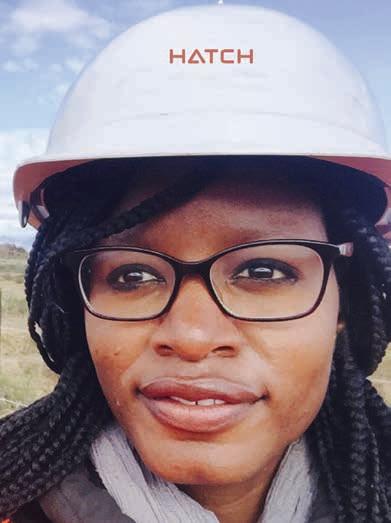A PUBLICATION OF THE CONFERENCE OF MINORITY TRANSPORTATION OFFICIALS





CHAIR
Tanya Adams
Senior Vice President, Director of Strategic Partnership
WSP USA
FIRST VICE CHAIR
Dr. Lester Woods
Chief Administrative Officer
Missouri Department of Transportation (MoDOT)
SECOND VICE CHAIR
Gwendolen Gray
Vice President, Program Management
HNTB
SECRETARY/TREASURER
Yetunde Olumide
Chief Financial Officer and Executive Vice President
Washington Metropolitan Area Transit Authority (WMATA)
MEMBERS-AT-LARGE
Johnell Bell
Founder and Chief Executive Officer
Espousal Strategies LLC
Chief of Equity Officer
Interstate Bridge Program
Sharon Jean-Baptiste
VP, East Central Transportation Growth Director
Jacobs
Debra Johnson
General Manager and CEO
Denver Regional Transportation District (RTD)
Kimberly Slaughter
Senior Vice President and Transportation Leader for North America
TYLin
Dave Wong
Vice President
Transportation Client Development Director
HDR

COUNCIL OF PRESIDENTS REPRESENTATIVES
Steve Granson
COMTO Houston President
Associate Vice President - Project Development Leader HNTB
Richard Watson
COMTO New York President
Senior Director, Labor and Employee Relations
Metropolitan Transportation Authority of NY
Edna Stanley
COMTO SoCal President
Deputy Chief Operations Officer of Transit Service Delivery Los Angeles Metro

Transforming
We ensure transportation serves all.
We believe that all lived experience moves the world. We believe that the leadership of a massive industry that has the responsibility of transporting all people, all the time, should reflect the communities it serves. We believe that commitment to uplifting all people moves us forward every day.
Alabama
Charlotte Shaw
Arizona
Tony Santana
Atlanta
Kenyata Smiley
Austin
Yannis Banks
Boston
Aboubacar Konate
Central Florida
Iranetta Dennis
Chicago
Rovaughn Graham
Cincinnati
Sally Stewart McKinnie
Cleveland
Daveda Bencs
Colorado
Rico Nelson
Columbus
Quincy Howard
Connecticut
Sharon Okoye
District of Columbia
Jeff Parker
Ft. Lauderdale
Annette Payne
Hampton Roads
Sheri Dixon
Honolulu Hawaii
Roland "JR" Carino
Houston
Steve Granson
Jacksonville
Tsopie Trottie
Kansas City
Maurice Gay
Louisiana
Jamal Smiles
ACCELERATE is a publication of the Conference of Minority Transportation Officials (COMTO). Articles may not be reproduced without the publisher’s written permission.
PUBLISHER & EDITOR IN CHIEF
April Rai, President & CEO, COMTO
STAFF WRITERS & CONTRIBUTORS
Delia Goncalves
Vice President, External Affairs
Nadji Kirby
Managing Director Strategic Initiatives & Stakeholder Engagement
Kristen Cox
Sr. Manager, Membership & Chapter Engagement
Maryland
Oluseyi Olugbenle
Memphis
Avery Mull
Miami
Wade Jones Jr.
Michigan
Beverly Watts
Minnesota
Tekia Jefferson
Nashville
Kia Lewis
New York
Richard Watson
North Carolina
Ebony Pittman
North Texas
Gabriel Beltran
Northern California
DeNise Lynell Blake
DESIGN
Doug Hunley | Design DCH
COMTO Headquarters 4121 Wilson Blvd Suite 901
Arlington, VA 22203
Phone: 202-506-2917
Email: info@comto.org Website: comto.org
Oregon/SW Washington
Coral Egnew
Palm Beach County
Ann McNeill
Philadelphia
Carrie Givhan
Pittsburgh
Jerimaine Ward
Richmond
Joe Dillard
San Antonio
Maurice Bridges
Southern California
Edna Stanley
St. Louis
Vivian Martain
Toronto & Region
Mavara Turab
Washington State
Grantley Martelly

Welcome to the summer 2025 issue of Accelerate, the annual publication of the Conference of Minority Transportation Officials (COMTO). This edition coincides with our 2025 National Meeting and Training Conference, which is centered on the theme: “Path to Prosperity: Transportation for Connected, Thriving, and Sustainable Communities.”
As the transportation industry and this nation navigates a transformative period, this issue delves into critical intersections of infrastructure investments, innovative design, emerging technologies, and meaningful community engagement to ensure that the benefits of these advancements are distributed to all.
In this issue, we highlight the work of WSP as it adapts to the future of growing cities. Analysts predict that in just 25 years, 7 out of 10 people worldwide will live in urban areas. WSP is combatting urban sprawl and supporting sustainable growth through Transit Oriented Development. Innovators and visionaries are not only reimagining cities with TOD but expanding its benefits by creating Transit Oriented Communities. TOCs represent the next level of TOD. From a planning and design perspective, community-focused outcomes result from the combined efforts of people who work with form, activity and meaning to support and enhance the value the community places on a given location.
GFT is paving the way for comprehensive infrastructure. Read about GFT’s community-centered approach to business that can be seen in projects from Baltimore, Maryland to Los Angeles, California. GFT’s dedication to thoughtful design begins with a comprehensive approach that ensures projects not only improve the lives of those impacted by the work but also engage all voices from conception to execution while also being culturally relevant and meaningful.
Jacobs discusses its decades-long project advancing the nation’s busiest airports for the future of air travel. Jacobs and its partners have contributed to the growth of HartsfieldJackson Atlanta International Airport by expanding its runway, upgrading its terminal and rental car facility, and offering airport-wide asset management strategy. This

includes developing training programs, collaborating on personnel resources, identifying and mitigating construction risks, holding stakeholder meetings, and continuously improving project delivery.
Be inspired by Latinos in Transit’s shared mission with COMTO. LIT is creating opportunity, driving growth, and connecting communities to ensure the transportation industry reflects and uplifts the communities it serves. Read more about LIT’s AI-powered structured mentorship program, an expanded Leadership Summit and Academy, and the launch of a nationwide K-12 public transit career curriculum introducing young students to careers in transit.
This issue of Accelerate is a call to action for all stakeholders in the transportation industry to build stronger, safer infrastructure by first developing all communities and untapped talent from within. By highlighting varied perspectives and innovative approaches, we aim to inspire continued progress toward a transportation system that truly serves everyone.
As you explore these articles, we hope you are encouraged by the stories of progress and innovation and motivated to join us in ensuring transportation serves all. Let us work together to build our collective path to prosperity through a transportation system that creates connected, thriving, and sustainable communities.







Over 500 transportation leaders from across the country gathered in the Nation’s Capital to celebrate 10 trailblazing women as they received the industry’s most coveted award. COMTO, North America’s premier industry organization ensuring transportation serves all, is hosted its 14th Annual Celebrating Women Who Move the Nation Awards Breakfast at the Smithsonian American Art Museum and National Portrait Gallery, Wednesday, May 21, 2025, 8:00 –10:00 AM. The award recognizes women leaders for their excellence, innovation, and exemplary dedication to transportation. The 2025 COMTO Women Who Move the Nation Honorees are:
1. Tanya Adams, SVP, Director of Strategic Partnership, WSP
2. Rhonda Briggins, Vice President, Transit Service, Jacobs
3. Daniella Levine Cava, Mayor, Miami-Dade County
4. Nikki Frenney, Vice President, Customer Success, MV Transportation
5. Lori M.K. Kahikina, Executive Director & CEO, Honolulu Authority for RapidTransportation
6. Coree Cuff Lonergan, CEO/General Manager, Broward County Transit
7. Yvonne Lopez-Diaz, Vice President, HNTB8.Yetunde Olumide, CFO, WMATAWashington Metro Area TransitAuthority
9. Dottie Watkins, CEO, CapMetro
10. Eve Williams, President, Dikita Enterprises
“Uplifting all lived experience at the decision-making table is one of COMTO’s core values,” said April Rai, President & CEO of COMTO, “recognizing these leaders during Women’s History Month is an intentional act of appreciation, inspiring the next generation of transportation leaders to emulate their strength, resilience, and perseverance.” Each honoree gave heartfelt and inspiring speeches after President & CEO April Rai presented their awards. Delia Gonçalves, Vice President, External Affairs, returned as the event’s emcee. The ceremony was also highlighted by our dynamic keynote speaker Frederique Irwin, President & CEO of the National Women’s History Museum. Irwin congratulated the honorees in their roles as living history and shared the museum’s inspiring campaign, She Is Not a Footnote.To date, COMTO has inducted 152 women into its Celebrating Women Who Move the Nation signature class of leaders. The honorees encompass a variety of multi-modal transportation, spanning both the public and private sectors.












Jacobs congratulates the Conference of Minority Transportation Officials on your 54th Annual National Meeting and Training Conference.
At Jacobs, we see an opportunity to keep the world moving forward. We understand the transportation landscape and how it’s evolving to ensure a more resilient and sustainable future. When it comes to navigating the challenges and complexities involved in building mobility networks, we are up to the challenge.
We’re pushing the limits of what’s possible.

GFT blends Gannett Fleming’s legacy of infrastructure innovation with TranSystems’ comprehensive transportation expertise to deliver resilient, future-ready multi-modal solutions. Our unified brand reflects a deeper purpose: to deliver with excellence, lead with equity, and uplift the diverse voices driving our industry forward.
From integrating cutting-edge technologies and enhancing transportation networks, we are redefining what it means to move people, connect communities, and shape the future of transportation.
As a proud COMTO Gold Industry Partner, we’re honored to support the women who lead, inspire, and move the nation.

gftinc.com



By Ruben Landa
Booming city populations around the world put an intense focus on transit. Over half of the world—more than 4 billion people—live in cities, and this number is increasing. By 2050, nearly 7 out of 10 people will.
Creating livable and vibrant urban areas in growing cities requires a fresh and forward-thinking approach to shaping communities. This is no small task as socio-economic issues and intensifying environmental challenges continue to impact decision-making.
Transit-oriented development (TOD) and Transit-oriented community (TOC) approaches can play a vital role.
When using land and natural resources around public transit efficiently, TOD counters sprawl and supports sustainable urban growth. By focusing on dense centers and transit nodes, rather
Dallas Union Station is one of the centerpieces of the downtown development in the Kay Bailey Hutcheson Convention Center master plan
than low-density car-oriented growth, TOD reduces the need to develop rural areas and valuable open spaces. TOD also can support safer mobility through well-designed pedestrian access to transit.
TOD also relieves congestion in metropolitan areas. Greater connectivity opens opportunity for people with disabilities, young people, the elderly and people who do not own cars or prefer not to drive – offering the ability to use multiple modes of transportation, especially when active transport and micromobility options are linked to station hubs.
“TOD provides real benefits for transit agencies,” Manjeet Ranu, senior vice president and national planning lead for WSP in the U.S., said. “Housing and employment opportunities near stations drives ridership demand, and the development of agency-owned properties near a station can provide a new revenue source.”
TOD evolves to TOC when transit anchors urban form. TOC is achieved by combining appropriate contextual urban density, land use diversity and high-quality design to foster flourishing communities that can easily connect to other communities. It requires creating inviting and inclusive public realms.
From a planning and design perspective, community-focused outcomes result from the combined efforts of people who work with form, activity and meaning to support and enhance the value the community places on a given location. Form is shaped by developers, architects, landscape architects and transport planners; activity refers to frequency of transport and curation of public space; and meaning involves public art, local/indigenous engagement and interpretation.
Four guiding principles drive the shift from development to community:
Connect to public transit
A recent WSP paper, Transit-Oriented Communities Advance Sustainable Cities, takes a detailed look at these guiding principles and how they are shaping TOC approaches in growing cities, here in the U.S. and around the world. It is pioneering work, preparing big cities for a sustainable future of improved mobility and connectivity.
DOWNLOAD THE PAPER HERE.

https://www.wsp.com/en-gl/insights/ transit-oriented-communities-advance-sustainable-cities
Ruben Landa is Vice President and Texas & Louisiana Region lead for Advisory and Planning at WSP. A member of COMTO since 2000, Landa is a former national board member and four-year president for COMTO North Texas.

Greater connectivity opens opportunity for people with disabilities, young people, the elderly and people who do not own cars or prefer not to drive










Congratulations to COMTO on another banner year ensuring transportation serves all.
We stand with you in your belief that all lived experience moves the world and your commitment that uplifting all people moves us forward every day.



Jacobs has played a key role in developing HartsfieldJackson Atlanta International Airport (ATL) since 2001. We’ve supported projects like the 5th Runway, Maynard Jackson International Terminal, Consolidated Rental Car Facility, and airport-wide asset management strategy. Our Operation Management and Facilities Services (OMFS) team provides maintenance for the domestic terminal and concourses, contracted by the Atlanta Airlines Terminal Company (AATC).
Currently, we provide construction management support for over 180 capital projects at ATL as part of its $20 billion capital improvement program, “ATLNext.” Under the joint venture “ATL Construction Management Partners” with Parsons Transportation Group, Inc. and Rohadfox Construction Control Services, we support projects aimed at rehabilitating existing facilities, constructing new ones, and enhancing customer experience.
The ATLNext program, part of the Airport Use and Lease Agreement, extends for 20 years. Over $3.7 billion in projects
have been implemented, with $11.9 billion in active projects in planning, design, procurement, or construction phases. Recently, the program was reprioritized to include $4.9 billion in additional projects, totaling approximately $20 billion.
As construction manager, Jacobs assists the Department of Aviation in implementing ATLNext, working closely with the airport’s project management team to administer construction policies and procedures. This includes developing training programs, collaborating on personnel resources, identifying and mitigating construction risks, holding stakeholder meetings, and continuously improving project delivery.
By leveraging advanced opportunities to develop staff and introduce technology, we drive performance and innovation, ensuring we remain at the forefront of industry advancements with solutions like building information modeling, integrated project delivery platforms, and sustainability practices.



Our work impacts the efficiency and safety of the world’s busiest airport, enhancing infrastructure that supports global travel and commerce.
Our work impacts the efficiency and safety of the world’s busiest airport, enhancing infrastructure that supports global travel and commerce. We promote sustainability and innovation, setting benchmarks for the industry and supporting community and economic development by creating jobs, fostering tourism, and enhancing regional connectivity.
Looking ahead, ATL is poised for continued innovation and growth. Jacobs and our partners will continue enhancing the airport, focusing on expanding capacity and improving passenger experience. Investments in resilient construction materials, advanced security technologies, and community engagement will ensure ATL remains a safe and reliable hub for global travel. Our focus is on delivering adaptable projects
that meet today’s needs and future challenges, ensuring ATL serves as a premier gateway for air travel and a catalyst for economic growth.
Find out more about our work at ATL: www.jacobs.com/ projects/hartsfield-jackson-atlanta-international-airport


By Matt Tucker, HDR
Having spent more than 30 years in the transportation industry, one thing has become abundantly clear: Change is inevitable and accelerating, but the core need for comprehensive mobility solutions remains.
I really appreciate COMTO’s theme for this year’s meeting and its recognition that transportation is foundational to achieving community prosperity. Well considered and holistic investments in the transportation system do create thriving, sustainable communities.
I have served transit and rail agencies across North America, from Virginia to Arizona to California. The technology of today includes capabilities we could only dream of decades ago. The mobility pattern of users has and continues to rapidly shift. And yes, the political and regulatory environment has been constantly in flux.

But what hasn’t changed for us is the essential need for transportation services and our focus on delivering accessible, safe mobility for all. In changing and challenging times, this must remain one of our highest priorities and why an organization’s mission and vision statements are so important.
Immediately prior to joining HDR in 2023, I served 15 years as CEO of the North County Transit District, where our vision was “a comprehensive transit and mobility system that connects all North County San Diego residents and visitors to a healthy, economically vibrant, and thriving region.” The vision of NCTD, just like other agencies that I had the privilege to serve, embraced the notion of transportation supporting community prosperity.

Agency mission and vision statements can sometimes be ignored or belittled by skeptics who feel they’re vague, unhelpful, pie in the sky, or not relevant to the lives of customers. But they show their value in times of uncertainty and change. As we navigate new normals, experience some headwinds, and chart new paths, it is critical that we continue to embrace our core values and rely upon these guiding principles as we make key decisions.
This holds true for transit agencies certainly, but also for all of the transportation modes that COMTO includes. As a former CEO, I often considered key decisions from the perspective of a transit dependent customer standing at a bus stop on a rainy day or a single parent bus operator having to work early morning or late-night shifts with little scheduling flexibility.
As we move forward, our focus and decision-making needs to be centered on our core vision and mission. And we must remember the basic truths about our industry: Transportation improves lives and supports prosperity when done right. Because of our work, our neighbors, friends, families and children, and the communities we serve, have better lives and the opportunity to prosper. That’s something to be incredibly proud of, and a goal that all can get behind. What an exciting prospect. What a responsibility. What a privilege.
Matt Tucker is HDR’s global transit director.




DIFFERENTIATORS
• Extensive Transportation Industry Experience (Public &
• Proven Success in strategic Planning and Risk
• Comprehensive Portfolio Management Expertise
• Strategic, Data-Driven Decision-Making
•
•
•
•






Masai Lawson, Senior Talent Acquisition & DE&I Strategist
At GFT, we believe inclusion begins with how you show up. For us, that means working side-by-side with the communities we serve — listening closely, staying present, and designing infrastructure that reflects real lives and real needs.
The need to learn from past mistakes cannot be overstated. Inequity in infrastructure has had and continues to have a lasting impact on the most vulnerable communities. Meeting the needs of a variety of communities, from job opportunities to business growth and better access to public transportation, is key to creating infrastructure solutions for everyone.
Our dedication to inclusive infrastructure design begins with a comprehensive approach that ensures projects not only improve the lives of those impacted by the work we do but also engage all voices from conception to execution while also being culturally relevant and meaningful.
Before a single line is drawn or plan reviewed, we take time to understand the people at the center of every project. Community meetings, multilingual outreach, and local advisory boards help us shape work that fits — not just in terms of function but also in how it feels to live alongside it.


Rendering is of the Market Street Station from the Inglewood Transit Connector Engineering and Design project.
In Oakland, Calif., the Tempo Bus Rapid Transit line gives more people consistent, reliable access to work, school, and healthcare. In Phoenix, Ariz., construction of the Valley Metro Rail South Central Extension created more than 1,200 jobs while expanding transit options across historically disconnected neighborhoods. These projects also support growth through strong small business participation and local workforce development efforts.
In Baltimore, Md., the Penn-North Metro SubwayLink Station incorporates public art that reflects the surrounding neighborhood’s strength and history. In Los Angeles, Calif., the Crenshaw/LAX Transit Corridor includes design features that speak directly to the local Black and Latino communities. These choices weren’t made from afar — they came from deep, intentional collaboration.
The need to learn from past mistakes cannot be overstated.
In Brooklyn, N.Y., upgrades to the Livonia Avenue Station make it easier for people with limited mobility to travel safely and independently. Accessibility improvements like these don’t always make headlines, but they matter for someone trying to get to work, make a doctor’s appointment, or visit family.
Early community engagement helps deliver innovative transportation solutions that build stronger connections. For example, the Inglewood Transit Connector in Inglewood, Calif., provides connectivity between a critical international airport and downtown entertainment venues.
This is the kind of work we’re proud to do — thoughtful, shared, community-rooted. That’s how we build, not just infrastructure, but trust.


The Missouri Depar tment of Transpor tation is proud of its par tnership with COMTO. Together, we build connections with Missouri’s minority and disadvantaged communities.
■ MoDOT is now hiring in all areas of transpor tation at www.modot.org/careers.
■ Upcoming Design-Build projects and oppor tunities to DBEs across the state.
improvements to Interstate 70—offer contract
Want to learn more? Contact MoDOT’s Businesses Development and Compliance division at: DBE@modot.mo.gov.




By Wanda Klayman Interim Executive Director and CEO, IBTTA
The transportation industry faces a workforce crisis.
The Bureau of Labor Statistics projects 1.7 million highly skilled and advanced infrastructure employees (12%) will retire each year until 2031, leading to huge replacement needs. Combined with a $1.2 trillion infrastructure backlog across highways and transit, the need for skilled professionals has never been greater. Tolling plays a critical role in modernizing infrastructure, but attracting and retaining new talent remains a challenge.
The IBTTA Foundation, the charitable arm of IBTTA, is leading the charge by investing in the future through meritbased scholarships and leadership initiatives, ensuring that talented individuals from varied backgrounds have opportunities to pursue careers in transportation.
For nearly two decades, the IBTTA Foundation’s Leadership Academy has been a cornerstone of professional
development in tolling. Since 2008, this program has trained over 500 industry professionals, equipping them with leadership skills and industry knowledge. Many graduates have advanced to senior roles in toll agencies, engineering firms, and technology companies, demonstrating the impact of targeted talent development.
The Foundation’s scholarship program awards $5,000 scholarships annually to students pursuing transportationrelated degrees, providing financial support and access to IBTTA’s global network. Now, IBTTA is expanding its commitment with a new $10,000 Member Family Scholarship, supporting employees, children, and dependents of IBTTA members pursuing degrees in engineering, business, public policy, and technology. This initiative provides financial assistance for tuition, books, and other education costs while recognizing the dedication of IBTTA member families to the industry.
Hands-on experience is critical to building a sustainable workforce. Internships and apprenticeships provide


young professionals with exposure to tolling operations, engineering, and mobility technology. IBTTA members actively support these programs, creating structured opportunities for students to engage with the industry.
Strategic partnerships with universities, technical schools, and organizations like COMTO help expand career pathways for students of all lived experiences.
Workforce development isn’t just an industry priority—it’s an imperative for the future of transportation. As part of IBTTA’s 5-Year Strategic Planning process, workforce has

been identified as one of six key areas requiring focused action. IBTTA’s board, sponsors, and members recognize that modern infrastructure investments will only succeed if we have the people to design, build, operate, and maintain them. Addressing this challenge today ensures that tolling and transportation remain engines of innovation and economic growth for generations to come.
Wanda Klayman is the Interim Executive Director and CEO of the International Bridge, Tunnel and Turnpike Association (IBTTA), bringing over two decades of leadership to the organization. Since 2003, she has driven operational excellence, grown global membership, and elevated IBTTA’s meetings and education programs. Her efforts have fueled revenue growth and strengthened IBTTA’s role as a global advocate for tolling and user-financed transportation. Wanda also helped found the IBTTA Foundation with strong member support, advancing workforce development and community investment across the industry. Prior to her tenure at IBTTA, Klayman held senior roles in marketing and business development across the nonprofit and consulting sectors. She holds a degree in Journalism from the University of Maryland.








PROUD SPONSOR OF

SUPPORTING SUSTAINABLE INITIATIVES INCLUDING E-RTGS AND SHORE POWER. 2025







By Christina Villarreal, Executive Director
Public transportation is more than just moving people—it’s about creating opportunity, driving economic growth, and connecting communities. Yet, leadership in the industry has not always reflected the faces of its workforce. Latinos In Transit (LIT) is changing that by expanding workforce development, mentorship, networking, and education to prepare transit professionals for leadership roles and build a stronger future for the industry.
Over the past 18 months, LIT has scaled its programs to provide real career advancement opportunities. New initiatives include an AI-powered structured mentorship program, an expanded Leadership Summit and Leadership Academy, the Avanzando Workforce Task Force to bridge professional development gaps, and the launch of a nationwide K-12 public transit career curriculum introducing young students to transit careers.
LIT’s structured mentorship program now integrates AI technology to track progress, maintain professional boundaries, and create an efficient, guided experience for mentors and mentees. The Mentorship Guide is available for free in multiple languages and includes ADA accessibility features to ensure inclusivity. The guide can be accessed on LIT’s website. Additionally, the Leadership Academy has implemented a virtual classroom platform that tracks curriculum milestones, provides a mentor hub, and offers interactive learning to keep participants engaged.
LIT’s K-12 public transit career curriculum introduces students to careers in transit through an interactive digital platform. The program will be hosted on LIT’s website, and the curriculum includes STEM activities, storytime modules, educational videos, and lesson plans designed for students nationwide. By making these resources widely accessible, LIT is ensuring that the future workforce is introduced to transit careers early. The program is scheduled to launch in August 2025.
The future of public transportation depends on bold leaders who are ready to step up. LIT is building that future today. Whether you’re an industry veteran or just starting your career, there’s a place for you in this movement. Attend the LIT Leadership Summit (October 2-4, 2025), become a mentor, or support K-12 transit education. The time to invest in the next generation of transit professionals is now. Together, we can create an environment that empowers a workforce as dynamic as the communities we serve—driving the future of transit together. Empowered voices, stronger transit, brighter future!



Tilikum Crossing bridge carries trains, buses, streetcars, cyclists and pedestrians over the Willamette River in Portland, Oregon. (Credit: Travel Portland)
Thirty-plus years ago, new ideas about the linkage between public transportation and land use arose as light rail and then streetcars gained popularity as tools for revitalization in cities. Fast forward to today: transitoriented development (TOD) is mainstream and recognized for its economic return on investment. Rail-Volution, now Mpact, was founded on these ideas and has shaped the way generations of leaders approach their work. Here’s the story.
In the early 1990s, the City of Portland, Ore., hosted Regional Rail Summits, inviting citizens to explore how the expansion of the region’s first light rail line could benefit their neighborhoods. Initially drawing mostly local participants, the event increasingly attracted planners, public officials, engineers, activists and community leaders from Portland and beyond. In 1995, the City of Portland partnered with TriMet and Oregon Metro to launch the first national RailVolution conference.
People wanted to hear about light rail and how to develop around it. Portland found that using public transit investments to guide the inevitable development pressures could benefit the entire region, reducing infrastructure costs, providing citizens with greater transportation and housing options, and reducing VMT (vehicle miles traveled) throughout the region.
Meeting in a different city each year, the conference shared case studies of what was working and raised up new challenges and innovations. Together, attendees were figuring out how to design station areas, how to work with developers and how to increase the amount and effectiveness of citizen activism in local decisions.
The success of development along transit corridors was proof that transit-oriented development could work. The annual conference offered practical tools to diverse interests

and affirmed that changes in the way transportation and land use decisions are made are both possible and successful.
One of the leaders behind the first Regional Rail Summits, Congressman Earl Blumenauer, recently retired from the US Congress. He said,
“When this conference began as Rail-Volution, the goal was to make cities more vibrant by reintroducing rail and developing communities around it. Transit now comes in various forms and the conversation about livability also has evolved. The primary focus remains on involving community members, agency leadership and developers in leveraging investments to achieve maximum benefit. From the beginning, we have emphasized that the focus is not solely on the project, but also on the people and the communities outside the windows of the bus, train, or building.”

Fast forward to today: transit-oriented development (TOD) is mainstream and recognized for its economic return on investment.
The Mpact Transit + Community conference is returning to Portland, where the conversation first began, October 26-29, 2025.
Find out more at: mpactmobility.org/conference.






Airports are powerful engines of economic growth, driving local and national prosperity across the United States. Airports not only provide essential transportation services but also fuel job creation in industries such as hospitality, retail, and transportation. Recognizing this, the Airport Minority Advisory Council (AMAC) has advocated for policies that foster access, economic opportunities, and innovation for all within the aviation and aerospace industries since 1984. AMAC’s efforts champion the development of connected and thriving communities by ensuring small, minority and women-owned businesses are a part of the industry’s future. Given the current political and economic impacts on the aviation industry and small businesses, AMAC has remained proactive and diligent in advocating for the interests of its members.
AMAC WILL SOON:
Convene and collaborate with industry trade associations to leverage collective powers to influence policy and regulations
Host Capitol Hill Day and the Economic Opportunity & Policy Forum in Washington, DC, from March 26–28, 2025
Host a Legislative Meeting: A Conversation with the Experts session in New Orleans, LA, on Tuesday, July 1, 2025, and elected officials during the 40th Annual AMAC Airport Business Conference




AMAC will host its 40th Annual AMAC Airport Business Conference in New Orleans, LA, from June 28–2, 2025, in partnership with Louis Armstrong New Orleans International Airport.
Continuing the momentum, AMAC will host its 40th Annual AMAC Airport Business Conference in New Orleans, LA, from June 28–2, 2025, in partnership with Louis Armstrong New Orleans International Airport. This conference is a hub for advocacy, education, and networking, providing participants with vast opportunities to refine their expertise while building valuable connections and expanding their national presence. Through its advocacy efforts, AMAC is ensuring that economic prosperity is the focus, resources are prioritized, and communities remain connected.



COMTO Notes From The Hill: Connecting COMTO Members to Legislative News
On April 3, 2025, COMTO Headquarters launched its latest content series: COMTO Notes From the Hill.
This original series delivers timely, fact-based updates on transportation news and policy developments that directly impact COMTO members. While the content is nonpartisan and commentary-free, it focuses on key national issues affecting all modes of transportation and the stakeholders who operate within it. Each installment is published on LinkedIn, distributed via email, and archived in the News section of our website at COMTO.org.
Our first article was entitled: “Duffy plans to get ‘money out the door’ for thousands of stalled projects.” The headline revealed two revelations when Transportation Secretary Sean Duffy appeared before the Senate Environment and Public
Works Committee. According to Sec. Duffy, 3,200 construction projects were in limbo at the DOT awaiting grant approval. Duffy told Congress he intended to streamline the process for states, “so they can spend more time turning dirt and less time filling out paperwork. This article also gave a glimpse into the political dynamics on Capitol Hill and Sec. Duffy’s relationship as a former colleague during his tenure as a Republican Congressman from Wisconsin (2011-2019). The Secretary made his comments during his first appearance before the Senate Environment and Public Works Committee on the Surface Transportation Reauthorization Bill.
According to Committee Chair Sen. Shelley Capito (R-WV), the bill has three goals:


Improve safety and reliability of America’s surface transportation network with impactful investment.
Reform and modernize federal programs and processes to increase efficiency.
Address a variety of surface transportation needs across states.
Since then, we have highlighted the administration’s plan to retain and recruit air traffic controllers, enforce compliance with federal executive orders that impact COMTO, staffing shortages and RIFs (reduction in force) at the USDOT, and the FY2026 budget. Sec. Duffy requested $26.7 billion in discretionary funds for Fiscal Year 2026.
The request included:
$1.2 billion increase for air traffic modernization and operations
$596 million to improve port and shipyard infrastructure.
$400 million boost for freight rale safety
$770 million for multimodal freight expansion
In a rapidly changing political climate, members can rely on this regular feature to stay up to date on the latest federal transportation news. COMTO Notes From the Hill aims to inform and empower our members with the knowledge they need to do business and continue being good stewards of COMTO’s mission of ensuring transportation serves all.
Hatch is steadfast in its commitment to nurturing all lived experience across the engineering landscape. In partnership with COMTO, we are driving positive change and creating opportunities for under-engaged communities.
Together, we’re devising a blueprint to elevate talent from all backgrounds and foster innovation.
Learn more on hatch.com
COMTO_Half_page_ad.pdf 1 6/19/2025 2:22:29 PM









Celebrating our 55th Anniversary! We’ll see you in Washington D.C. for the 55th COMTO National Meeting & Training Conference! July 25–28, 2026 Grand Hyatt, Washington D.C. Watch for details!


